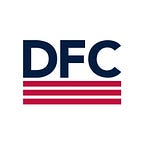On World Water Day, celebrating practical solutions to a staggering problem
By Merryl Burpoe
Like almost one-quarter of the people in the world, Aisyah, a farmer and mother in Indonesia, lived without safe drinking water in her home. She rose before dawn to walk and gather water for her family, before going to work in her rice fields.
A $200 microfinance loan changed her life. Aisyah invested the money to install a tap to connect her home to her town’s piped water. Freed from the time-consuming task of collecting water, she was able to earn more income and repay the loan in a matter of months.
Aisyah’s story is similar to those of more than 500,000 borrowers across Asia, Africa, and Latin America, who have been able to introduce piped water, a modern toilet, or other clean water and sanitation to their homes with the support of WaterEquity, a DFC partner and nonprofit impact investor, that provides loans to microfinance institutions in the WASH (water, sanitation, and hygiene) sector. By partnering with local microfinance institutions, WaterEquity has helped nearly three million people access clean water or sanitation in their homes and communities, and a $100 million DFC loan has enabled WaterEquity to expand its reach to Guatemala, Kenya, and other developing countries.
Globally, more than 771 million people — one in 10 — live without access to basic water services. This extreme shortage of an essential resource has dire consequences not only for health, but also economic growth, and even efforts to achieve gender equality. Since the chore of gathering water typically falls to the women and girls, many miss school and are kept out of the workforce.
The world’s water shortage also extends beyond individual homes. Almost two billion people lack clean water at local healthcare facilities and every year, an estimated 17 million give birth without adequate water, sanitation, and hygiene.
Investing in water, sanitation, and hygiene (WASH) is a core part of DFC’s work to bolster healthcare in the developing world. DFC’s most recent impact data shows significant progress. WASH investments in DFC’s portfolio are projected to help more than 889,000 people around the world access water, sanitation, and hygiene over five years.
This extensive reach reflects DFC’s broad support for a variety of clean water and sanitation investments from microfinance lending to critical infrastructure.
In El Salvador, where one-third of the population depends on water from external sources outside of the home, DFC financing tothe special lending vehicle Azure Source Capital is supporting investments in pipes, pumps, and storage tanks to improve water supplies for 300,000 people, along with training needed to empower local residents to operate their own water systems.
This financing supported multiple loans to local communities, including the Nahuizalco municipality in El Salvador’s Sonsonate department, which used a $30,000 loan to expand distribution systems to reach more than 1,000 households.
In Sub-Saharan Africa, where limited access to clean water is a major cause of disease and death, a DFC loan is supporting the expansion of JIBU, a water filtration franchisor. JIBU works with small franchisees who filter and sell clean bottled water, serving thousands of customers a day.
And across much of the developing world, where agriculture is the most common occupation, insufficient water can make it impossible for subsistence farmers to produce sufficient food for their families. Alice, a subsistence farmer in rural Kenya, once followed a costly and time-consuming process of collecting rainwater in jugs, walking miles to a nearby pond, and even buying water from a local vendor during the dry season.
Alice is another farmer who benefited from a microfinance loan, such as those supported by WaterEquity, which enabled her to buy a large water harvesting tank. The tank holds enough water to feed the animals, water the fruits and vegetables on the farm, and cover the family’s household needs.
Merryl Burpoe is Senior Advisor and the water sector lead in DFC’s Office of the Chief Development Officer.
Sources:
World Health Organization (WHO) and the United Nations International Children’s Fund (UNICEF) Joint Monitoring Program (2021). Progress on household drinking water, sanitation, and hygiene: 2000–2020.
WaterEquity data as of December 31, 2021.
Disclaimer: Impact profiles are for illustrative purposes only and may not represent existing WaterEquity investment outcomes. Story and photos provided by sister organization Water.org.
